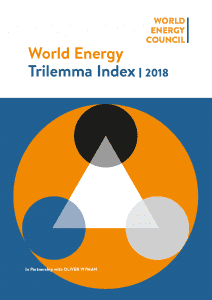Balanced Energy Systems Not Solely Luxury of Rich Economies

Strong and coherent energy policies that successfully integrate the three dimensions of sustainability, equity and security of supply which constitute the Energy Trilemma are not just the preserve of rich countries and can also drive positive performance of emerging and developing economies, according to a new report by the World Energy Council launched at World Energy Week today.
Although the top ten countries within the global Energy Trilemma Index in 2018 remains relatively stable, there are changes that buck the usual trend associated with national GDP with countries such as Slovenia entering the top ten at number six. Several nations show significant improvement and demonstrate that a balanced energy system is not a luxury, but a product of smart integrated approaches to the energy transition.
Taking a long-term view as energy systems transition, countries such as Nepal, Kenya and Bangladesh with more vulnerable economies, have significantly improved their Trilemma scores for Energy Equity while pursing the UN Sustainable Development Goal 7 agenda to improve energy access. The three nations have developed different policy pathways tailored to their national circumstances to improve significantly their citizens access to energy, varying from micro-grids, to micro hydro systems, with a focus on rural access.
The World Energy Trilemma 2018 published by the World Energy Council in partnership with global consultancy Oliver Wyman, a subsidiary of Marsh & McLennan Companies, shows eight nations achieving an AAA grade balance. Sweden, Switzerland and Denmark all retain their position at the top.
Philip Lowe, Chair of the World Energy Trilemma study group, said: “Developing and maintaining a robust, secure and equitable energy system requires a careful balance. This is more challenging in the context of a rapid transition to decentralised, decarbonised and digital systems where policy makers need to build capacity in each of the Trilemma dimensions. The 2018 World Energy Trilemma global ranking finds that many countries are balancing Energy Security, Equity and Environmental Sustainability, successfully while also highlighting where there could be scope to improve.”
The report highlights additional key findings:
- Some of the biggest improvers in 2018 are Middle East & Gulf and North African countries
- Energy Equity dimension ranking led by countries where energy is affordable due to government policies
- Six Gulf Cooperation Council (GCC) countries have improved their Trilemma performance with UAE ahead at number 36
- Countries with low energy intensity and as well as falling carbon intensity, resulting in lower emissions, perform well in the Environmental Sustainability dimension
- New Zealand remains top of the leader board in the Asia-Pacific region.
Francois Austin, Partner and Global Head of Energy at Oliver Wyman, said: “The World Energy Trilemma Index demonstrates that all countries, despite their economic stature, can aim to have a balanced energy system. Energy security and equity, and environmental sustainability can not only grow economies, but can also transform societies. Yet the complexity of issues facing the globalised energy industry are impossible for countries to tackle in isolation. Navigating through evolving policy and regulatory frameworks across states, along with innovating in the field of power generation, is key to achieving progress and maintaining balance.”
The Council will be evolving the Trilemma methodology to incorporate more longitudinal changes and trends for 2019.
You can download a copy of the report here : https://www.worldenergy.org/publication/trilemma-report-2018/
For media queries contact:
Lucy Chakaodza Tel: (+44) 20 3214 0616
Email: [email protected]
World Energy Council The World Energy Council is the principal impartial network of energy leaders and practitioners promoting an affordable, stable and environmentally sensitive energy system for the greatest benefit of all. Formed in 1923, the Council is the UN-accredited global energy body, representing the entire energy spectrum, with over 3,000 member organisations in over 90 countries, drawn from governments, private and state corporations, academia, NGOs and energy stakeholders. We inform global, regional and national energy strategies by hosting high-level events including the World Energy Congress and publishing authoritative studies, and work through our extensive member network to facilitate the world’s energy policy dialogue.
World Energy Trilemma Index The World Energy Council’s definition of energy sustainability is based on three core dimensions: Energy Security, Energy Equity, and Environmental Sustainability. Balancing these three goals constitutes a ‘trilemma’ and is the basis for prosperity and competitiveness of individual countries. The World Energy Trilemma Index has been prepared annually by the World Energy Council in partnership with global consultancy Oliver Wyman, along with the Global Risk Centre of its parent Marsh & McLennan Companies since 2010. The 2018 Energy Trilemma Index Report presents the result of the latest iteration of the Trilemma model, which analyses global energy systems data and includes 130 national profiles. Rankings have only been produced for 125 countries due to data limitations. The index comparatively ranks the countries in terms of their ability to develop a secure, affordable, and environmentally sustainable energy system. It provides an assessment of a country’s energy system performance, reflecting balance and robustness in the three trilemma dimensions. Access the complete Index results and use the interactive Trilemma Index tool and its pathway calculator to find out more about countries’ trilemma performance and what it takes to build a sustainable energy system: www.worldenergy.com/data


